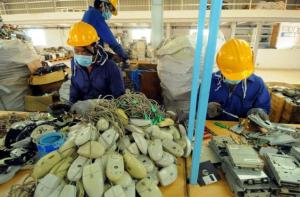
Tonight as I sat feeding my daughter, I read an article on my smart phone about techy people that are saying ‘no’ to smart phones and holding onto their old mobile telephones. These people want to be ‘disconnected’ to a degree when home: to not be contactable and to not be distracted by their new devices.
So could these people be onto something? As more and more new electronic devices are introduced, consumers quickly rid themselves of their mobile telephones, computers, laptops, tablets etc for the newest and greatest. So what happens to all of these devices? Where do they end up?
Very likely this electronic waste or e-waste ends up in places like Guiyu in China or Agbogbloshi in Ghana where people work to take apart the electronic devices to extract metals such as copper and steel. While some of these metals have a value to those that collect them, electronic devices also contain many nasty chemicals such as lead, mercury, arsenic, cadmium, selenium and the list goes on. Once the valuable materials have been extracted out of the devices (usually in crude ways such as burning), the rest is dumped with little regard to its environmental impacts or impacts on the health of communities that deal and manage this waste.

Now to prevent the transport of hazardous waste around the world, the BASEL convention was set up. The Basel Convention on the Control of Transboundary Movements of Hazardous Wastes and Their Disposal was established in 1989 and this treaty has been signed by over 180 countries. E-waste is covered under this treaty which is what makes the movement of all of this electronic waste from developed countries to developing countries like China, Ghana and India troubling. One way this is happening is that old computers, televisions and mobiles are given as ‘gifts’, except that these gifts often don’t work!
Here is a good clip on e-waste: http://www.youtube.com/watch?v=5A5zVNpkuzk
The AMP project
The Abu Dhabi Eco-Chicks is a group of dedicated eco-minded women and when we were established, we were all living in Abu Dhabi. Many of us however moved away and are working in all parts of the globe, from Africa, the Philippines to Australia. One of our super dedicated and passionate Eco-Chicks, Dr Yasmine Abbas is currently working in Agbogbloshie on the Agbogbloshie Makerspace Platform (AMP) project.
This initiative is a: “collaborative project to upgrade the quality of life and environment at Agbogbloshie, an e-waste ecosystem in Accra, Ghana” (http://qamp.net/project/) . This project seeks to empower and facilitate the diversification of income from the scrap dealers by upcycling the scrap e-waste into things like refrigerators and microwave ovens!

What can you do?
While this initiative is so important because it is working with those that are bearing the brunt of our consumerist disposal society, what can we do to prevent this waste from ending up in places like Agbogbloshie?
• Where economically feasible, repair machinery, appliances and equipment in preference to purchasing new equipment.
• Purchase electronics from those that you know have a take back policy. For example Hewlett Packard have extended their take back and recycling program to cover the UAE. To participate in this, please go to: http://h41111.www4.hp.com/globalcitizenship/uae/en/environment/recycle/hardware.html and complete the online form.
• Contact reputable e-waste recyclers in the UAE about how to recycle your electronic waste. These recyclers should be able to ensure electronic waste does not end up in unregulated places like developing countries. An example of an e-waste recycler operating in the UAE is: Enviroserve: http://www.enviroserve.ae/services/e-scrap/
• Please share this article with your friends and contacts!


